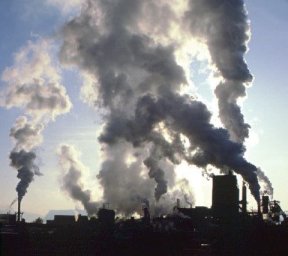Why do we need an alternative energy source?
The answer is simple, and comes in two parts, based upon ecology's two principle criteria for distinguishing between eco-friendly and ecologically destructive technologies. First, none of our major energy sources are sustainable. Second, almost all of our major energy sources pollute the environment.
Nuclear power, for example, is widely touted by some as a "solution" to global warming because it creates no greenhouse emissions. It does, however, create toxic nuclear waste which is deadly to all life for thousands of years. Fissionable material is also available in only limited quantities. Thus, nuclear power is not only anti-ecological, but also not a sustainable option when it comes to dealing with our energy needs. The vast majority of our energy, however, currently comes from fossil fuels. These include: coal, oil and natural gas. The current article will therefore focus upon them.
Fossil Fuels Are Not A Sustainable Source of Power:

The first problem with fossil fuels is that they are not a sustainable source of energy. Fossil fuels are essentially ancient organic material which has been transformed by various geological processes into combustible form. Thus, they truly are "fossils" of ancient organic life.
The problem is that all exist in limited quantities, which are used up as they are consumed. While coal remains relatively abundant, it is by far the dirtiest of the three (only slightly cleaner than burning wood). Natural gas is also available in fairly large quantities, and much cleaner, but is only a short term solution to our energy needs at best.
Petroleum, or oil, is very quickly being used up. In fact, Campbell & Laherrere (1998), two oil company analysts, predicted almost a decade ago that world oil production would peak and begin to decline within a decade. They used the same methodology which /successfully/ predicted the peak of oil production in the continental United States. And with China and India industrializing, and demand increasing, petroleum is not likely to last until the end of the present century. It will also become increasingly expensive as demand exceeds supply.
The Ecological Effects of Fossil Fuel Dependence:
Beyond the fact that fossil fuels are unsustainable, however, is the fact that they are ecologically destructive. We are surely all aware of the destructive potential of large oil spills such as the Exxon Valdez disaster, for example.
Less well known, and more insidious, is the fact that ground water is being polluted by petroleum, as Sampat (2000) points out. This is due to our habit of building underground storage tanks for gasoline at fueling stations. When these tanks develop slow leaks it is often undetected for a long period of time. Even when it is detected, it is often not fixed. The slow leak of petrochemicals ends up in underground water reservoirs, or "aquifers." These are the sources upon which wells draw for drinking water. Many aquifers throughout North America and Europe are already polluted, and depending on their recharge rate (the time it takes to flush them with new water), could remain so for centuries.


